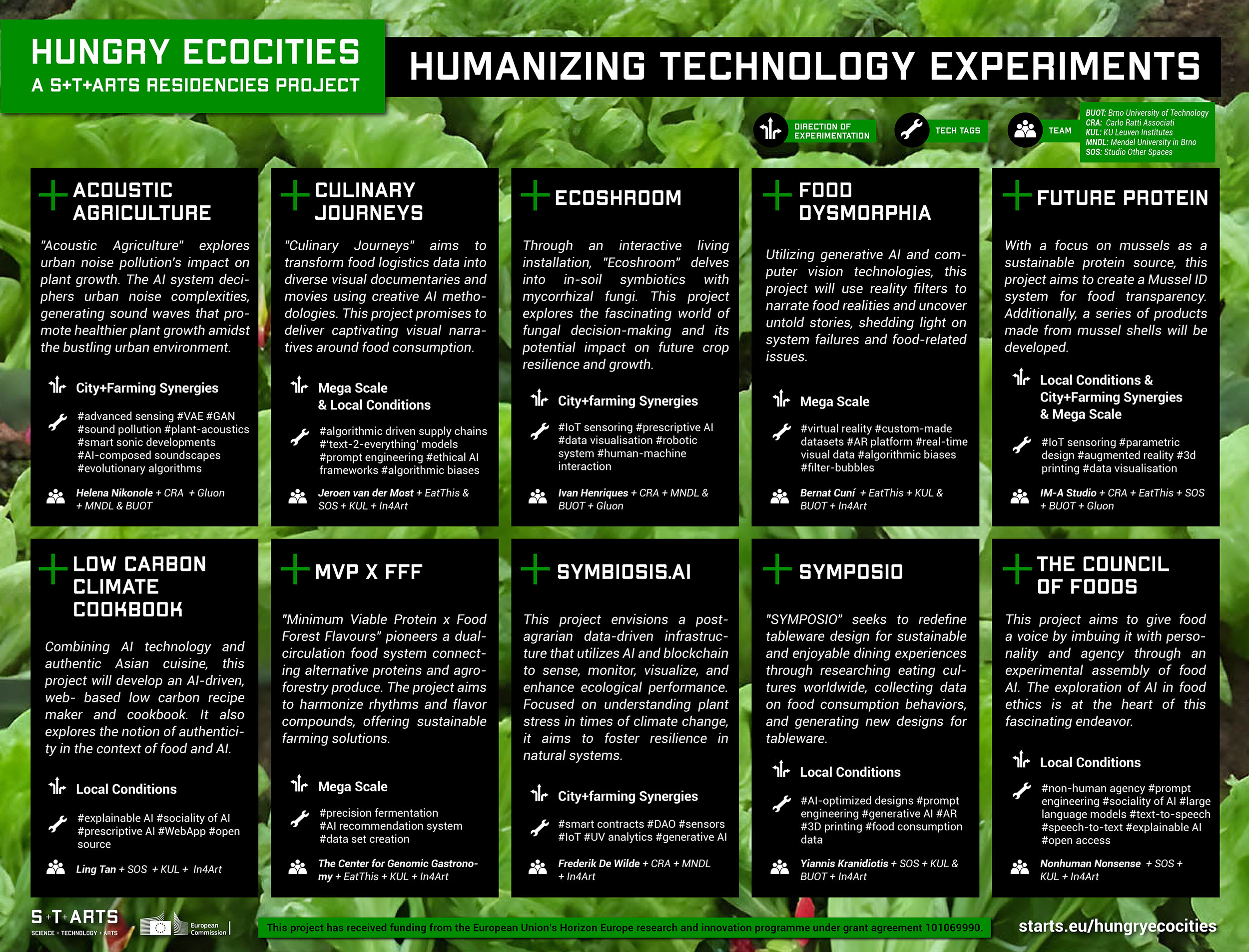Humanizing Technology: Introducing the Visionary Winners of Hungry EcoCities’ 1st Open Call
Although agriculture provides citizens with essential produce, it is also responsible for almost 40% of annual emissions of greenhouse gases such as methane and nitrous oxide.1 With dredious effects of climate change and while still feeding the global population, we need to re-think how do we produce, consume, enjoy and disrtibute food. Hungry EcoCities is a groundbreaking initiative that bridges the gap between art, technology, and ethical food practices bringing innovation to the core of food production. The project aims to harness the power of creativity and AI to revolutionize the food industry and address the challenges of urbanization and climate change.
Today, Hungry EcoCities is thrilled to announce the results of its inaugural Open Call, “Humanizing Technology Experiments“. Among numerous inspiring applications, the Hungry EcoCities project partners with the support of 24 (external and internal) evaluators had the challenging task of choosing ten extraordinary projects. The selected projects demonstrate a profound commitment to ethical food practices and sustainable approaches, showcasing the potential for art and technology to shape a better future.
1 https://www.frontiersin.org/articles/10.3389/fsufs.2020.518039/full#B29
The Winners
We have selected 10 projects from visionary artists who’s AI-driven concepts stood out for their innovative ideas, challenging the boundaries of technology, and exploring ethical food practices.
We are excited to start the humanizing technology experiments with our winners and look forward to their experiments kick-off from their own studios located in Spain, Greece, Belgium, The Netherlands, Poland, England and Germany. They will add yet another multidisciplinary and multinational perspective to the Hungry EcoCities -teams, since the nationality of the artists differ from Isreali, Dutch, Russian, Latvian, Spanish to American, Brazilian, Singaporean, Swedish, Belgium and Greek.
Together we will explore all these 10 visionary routes and we wish the artists luck and joy on our collaborative journey. Let’s meet the projects that are set to take part in the revolution of the future of food through art and AI.
+ACOUSTIC AGRICULTURE
By Helena Nikonole
Combining AI and biotech tools, “Acoustic Agriculture” explores urban noise pollution’s impact on plant growth. The AI system deciphers urban noise complexities, generating sound waves that promote healthier plant growth amidst the bustling urban environment.
+ CULINARY JOURNEY
By Jeroen van der Most
“Culinary Journey” aims to transform food logistics data into diverse visual documentaries and movies using creative AI methodologies. This project promises to deliver captivating visual narratives around food consumption.
+ ECOSHROOM
By Ivan Henriques
Through an interactive living installation, “Ecoshroom” delves into in-soil symbiotics with mycorrhizal fungi. This project explores the fascinating world of fungal decision-making and its potential impact on future crop resilience and growth.
+ FOOD DYSMORPHIA
By Bernat Cuní
Utilizing generative AI and computer vision technologies, this project will use reality filters to narrate food realities and uncover untold stories, shedding light on system failures and food-related issues.
+ FUTURE PROTEIN
By IM-A Studio
With a focus on mussels as a sustainable protein source, this project aims to create a Mussel ID system for food transparency. Additionally, a series of products made from mussel shells will be developed, adding value to this vital marine resource.
+LOW CARBON CLIMATE COOKBOOK
By Ling Tan
Combining AI technology and authentic Asian cuisine, this project will develop an AI-driven, web-based low carbon recipe maker and cookbook. It also explores the notion of authenticity in the context of food and AI.
+ MVP x FFF
By The Center for Genomic Gastronomy
“Minimum Viable Protein x Food Forest Flavours” pioneers a dual-circulation food system connecting alternative proteins and agroforestry produce. The project aims to harmonize rhythms and flavor compounds, offering sustainable farming solutions.
+ SYMBIOSIS.AI
By Frederik De Wilde
This project envisions a post-agrarian data-driven infrastructure that utilizes AI and blockchain to sense, monitor, visualize, and enhance ecological performance. Focused on understanding plant stress in times of climate change, it aims to foster resilience in natural systems.
+ SYMPOSIO
By Yiannis Kranidiotis
“SYMPOSIO” seeks to redefine tableware design for sustainable and enjoyable dining experiences. AI-optimized designs will be developed by researching eating cultures worldwide, collecting data on food consumption behaviors, and generating new designs for tableware.
+ THE COUNCIL OF FOOD
By Nonhuman Nonsense
This project aims to give food a voice by imbuing it with personality and agency through an experimental assembly of food AI. The exploration of AI in food ethics is at the heart of this fascinating endeavor.
Themes and trends
To summarize, we have identified some key overlapping themes and trends that can be observed across the different experiments.
Integration of technology in agriculture: Several projects emphasize the use of AI and sensing technologies to enhance various aspects of agriculture. Whether it’s through analyzing plant acoustics, studying the impact of mycorrhizal fungi on crop growth, or utilizing AI to optimize food production and minimize environmental impact, these projects highlight the role of technology in improving efficiency and sustainability in agricultural practices.
Sustainable food production and environmental impact: Many of the projects focus on sustainable food production and reducing the environmental impact of various processes within the food industry. Whether it’s through vertical gardens that mitigate noise pollution, AI-driven low carbon cookbooks, or the use of shellfish farming to filter water and collect CO2, there is a strong emphasis on applying technology to create more environmentally friendly and sustainable food production systems.
Empowerment through knowledge and awareness: A common theme among the projects is the empowerment of consumers and communities through knowledge and awareness. By using AI to reveal hidden aspects of the food industry, such as externalized costs, or by creating platforms that educate people about the impact of their food choices on the environment, these projects aim to foster informed decision-making and deeper engagement with food-related issues. Many projects also aim to create engaging experiences, exhibitions, and interactive platforms that encourage public participation, knowledge dissemination, and dialogue on sustainable food practices. These initiatives foster a sense of responsibility and engagement within communities to promote a more sustainable food future.
Cultural and social engagement with food: Several projects seek to engage with food from a cultural and social perspective. Whether it’s through exploring authentic Asian cuisine, redefining tableware design for diverse dining experiences, or creating interactive platforms where food “speaks” to consumers, these projects aim to bridge cultural gaps and create meaningful connections between people and their food.
The Evaluation Process
The evaluation process was conducted by 24 esteemed professionals with each application receiving feedback from three independent evaluators, afterwards the results were analysed and discussed by the consortia and selected by the jury, consisting of consortium partners.The task was no small feat—to handpick ten exceptional projects from a plethora of impressive entries.
The careful review process, guided by a range of experts, revealed some interesting insights. Anneke Stolk, Co-founder of InstaGreen, found the artistic explorations of science and technology very impressive. “I was truly amazed by the quality of project proposals… The artists aimed for more than just changing agri-food systems,” Stolk shared. Dr. Dejan Mircetic, an AI engineer and scientist, noticed that artists and engineers see AI differently whereas Bart van Meurs, Founder of Division Q, praised the detailed planning and the knowledge in the proposals. These different views led to choosing ten exceptional projects that blend art and AI, ready to shape a better and more sustainable food world.
Monika Löve and Vincent Leung, partners at Carlo Ratti Associati, one of the 3 Studios that will host the artists and mentor them together with the technology and art-driven innovation partner, shared:
“We have dedicated a lot of time understanding how technology and other artificial elements could help nature thrive in urban settings. Agriculture is quickly becoming the frontier of the relevant research, and the proposals submitted to Hungry EcoCities are the perfect encapsulation of the many perspectives we can assume to create a more equitable, sustainable agri-food system. The artists have set a very high bar in establishing a new form of synergy between cities and farming practices. Their ideas not only address the shortcoming of the existing situation, but also envisage works of great artistic value – a significant factor to inspire and encourage the general public to partake in the conversation.”
About Hungry EcoCities
Hungry EcoCities will host 20 S+T+ARTS residencies to work towards defining, designing, and developing AI-enabled responsible, art-driven solutions for the end-users in the agri-food industries.
The project aims to harness the power of creativity and AI to revolutionize the food industry and address the challenges of urbanization and climate change by teaming up studios, universities, technological research experts, growers, agricultural specialists, artists and creative thinkers to come up with new ideas for the future food system.
In the first Open Call for proposals (2023-2024), the project consortium has chosen 10 artists for the “Humanizing Technology Experiments.” These artists have each selected one of three directions for experimentation: Mega Scale, Local Conditions, or City+Farming Synergies. The aim is to delve into digital inquiries by combining technology and art to achieve artistic agri-food AI usability outcomes.
The second Open Call (2024) will be focused on “10 Paths to progress Experiments”, where industrial end-user/SMEs from the agri-food sector and artists will jointly work on AI enabled use cases, potentially building upon the outcome sof open call 1 and work towards prototypes and awareness-raising artworks. The outcomes should make the food chain more transparent, inclusive and sustainable, build connections between different stakeholders in the food chain and promote more informed and sustainable consumption patterns.
This project has received funding from the European Union’s Horizon Europe research and innovation programme under grant agreement 101069990.


